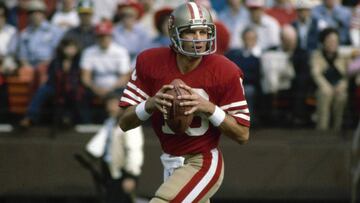Which Super Bowls were not a letdown?
Often, the best game of the NFL season has already been played and the Super Bowl will not live up to the hype. How rare is a competitive final game?


As a child of the late ‘70s and ‘80s, I remember the Super Bowl in two phases. My earliest memories of the Super Bowl were of a big game involving usually the Pittsburgh Steelers, Dallas Cowboys, or Oakland Raiders. They were exciting and fairly evenly matched. Franco Harris was my dad’s hero. “That is how you play football, son.” Hard-hitting, north-south running, between-the-tackles football. In those days, real men did indeed wear black. My father lamented the arrival of the West Coast offense in the early 80s, placing a higher value, as it did, on finesse over brute force.
December 23rd, 1972
— Goosebump Sports (@GoosebumpSports) January 30, 2022
A collision sends the ball flying to Franco Harris, who picks it up and scores to give Pittsburgh the playoff win! #FrancoHarris #TheImmaculateReception #GoosebumpSports #NFL #Steelers #Raiders pic.twitter.com/JIBSKTuAp6
The Super Bowls of the ’80’s, and well into the ‘90s, which made up the bulk of my teenage and early adult years, shifted as well. From the 49ers first appearance as a force to be reckoned with in the ’81 season, the NFC won every Super Bowl bar one until the end of the ’97 season. This coincidence of the short-pass-oriented style of play and the skewing of the Super Bowl created a sense within me and many of my generation that the Super Bowl is usually a letdown. The two best teams in the NFL were usually both in the NFC during this era, making the Super Bowl not so much a matchup of champions as much as the champion playing against the fourth or fifth best team. The margins were usually in double digits, the most egregious example being Super Bowl XXIV where the 49ers beat the Broncos by a score of 55-10.
January 28, 1990: Joe Montana, Jerry Rice, and the 49ers rout John Elway and the Broncos in Super Bowl XXIV. pic.twitter.com/0BVC5yoJgS
— This Day In Sports Clips (@TDISportsClips) January 28, 2022
Within this era, there were a few games that did get the heart pumping like the old days. Two of these were games often listed as some the most exciting Super Bowls ever. Super Bowl XXIII is appropriate today as it came to within a hair’s breadth of being repeated this year. The San Francisco 49ers met the Cincinnati Bengals in a game that hinged on Tim Krumrie’s broken leg. The Bengals’ defense, though stiff throughout, were not as dominant without him and Joe Montana got that legendary last minute drive to win a close contest 20-16.
Two years later, there was another nail-biter in Super Bowl XXV between the New York Giants and the Buffalo Bills. The Giants defense was coordinated by Bill Belichick and he was light-years ahead of the pack, lining up only two down linemen and shifting five linebackers around to completely shut Jim Kelly’s Bills offense down. It was on the back of this game that he was given the head coach job at Cleveland, ultimately starting him on the road to New England and total Super Bowl dominance a decade later.
The unique, and ultimately successful game plan deployed by #Giants defensive coordinator Bill Belichick entering Super Bowl XXV, designed to derail the Buffalo #Bills lethal "K-Gun" offense.
— Kevin Gallagher (@KevG163) January 28, 2022
This date in 1991 pic.twitter.com/FXneNTQRnJ
Perhaps the most memorable game was Super Bowl XIII which saw the Pittsburgh Steelers beat the Dallas Cowboys 35-31. All of the legends were there: Terry Bradshaw, Roger Staubach, Randy White, “Mean” Joe Greene, Lynn Swann, Franco Harris, Tony Dorsett, Chuck Noll, and Tom Landry. It was a back-and-forth contest and time simply ran out on Staubach.
Moving into the modern era, Super Bowl LI was the only game to go into overtime, seeing the New England Patriots come back from a 28-3 deficit to best the Atlanta Falcons 34-28. Tom Brady got the fifth of his record seven Super Bowl victories and Patriot fans got the roller coaster ride of a lifetime.
Having money on the Patriots in Super Bowl LI was one of the wildest days ever
— Eric Rosenthal (@ericsports) January 29, 2022
Congrats on the most successful career in NFL history, Tom Brady pic.twitter.com/fyfsr2SPBM
Super Bowls are often important not so much for the football on the field as for the symbols and meanings of what is happening in the larger NFL. When the AFL and NFL merged, as difficult as it may be to believe today, it was generally accepted knowledge that the NFL was the superior league. The AFL was seen in many quarters as a lower level, perhaps even as if the players were “not good enough” to play in the NFL.
Super Bowls I and II seemed to bear that out, with the Green Bay Packers riding roughshod over their AFL opponents. But the world seemed to stand on its head when Joe Willie Namath was drafted by both the AFL’s NY Jets and the NFL’s St Louis Cardinals. He chose to sign with the Jets and four years later won Super Bowl III. It was a stunning victory, with the Baltimore Colts widely touted as “the greatest football team in history.” Three days before the game, at an awards dinner, Namath publicly guaranteed the Jets’ victory and then coolly delivered on his promise. The AFL, later known as the AFC, would win the 11 of the following 13 Super Bowls.
Related stories
Recent years have seen a levelling of the competition between the two conferences, helped along greatly by expansion and a reshuffling of the divisional landscape. Hopefully, this has made for more competitive Super Bowls becoming the norm rather than the exception. Certainly there have been some corkers in recent memory. The underdog New Orleans Saints put paid to the Indianapolis Colts with a 31-17 come-from-behind victory in Super Bowl XLIV. The New York Giants did likewise to the heavily favored New England Patriots 21-17 in Super Bowl XLVI, with that memorable touchdown flop on the back of Eli Manning’s superb 40 yard pass to Mario Manningham.
With the high expectations in Los Angeles and the almost weekly underestimation of Cincinnati, perhaps Super Bowl LV will be one of the great come-from-behind underdog stories that ekes its way into football lore. Or perhaps the preconceived notions will prove themselves prescient, and this will be a lopsided snooze fest. Either way, the road to get here has been far more interesting than any game could ever live up to, and in the end, isn’t that what it is all about?
#SuperBowl house call. pic.twitter.com/iX4iSu3fO4
— Los Angeles Rams (@RamsNFL) January 31, 2022

